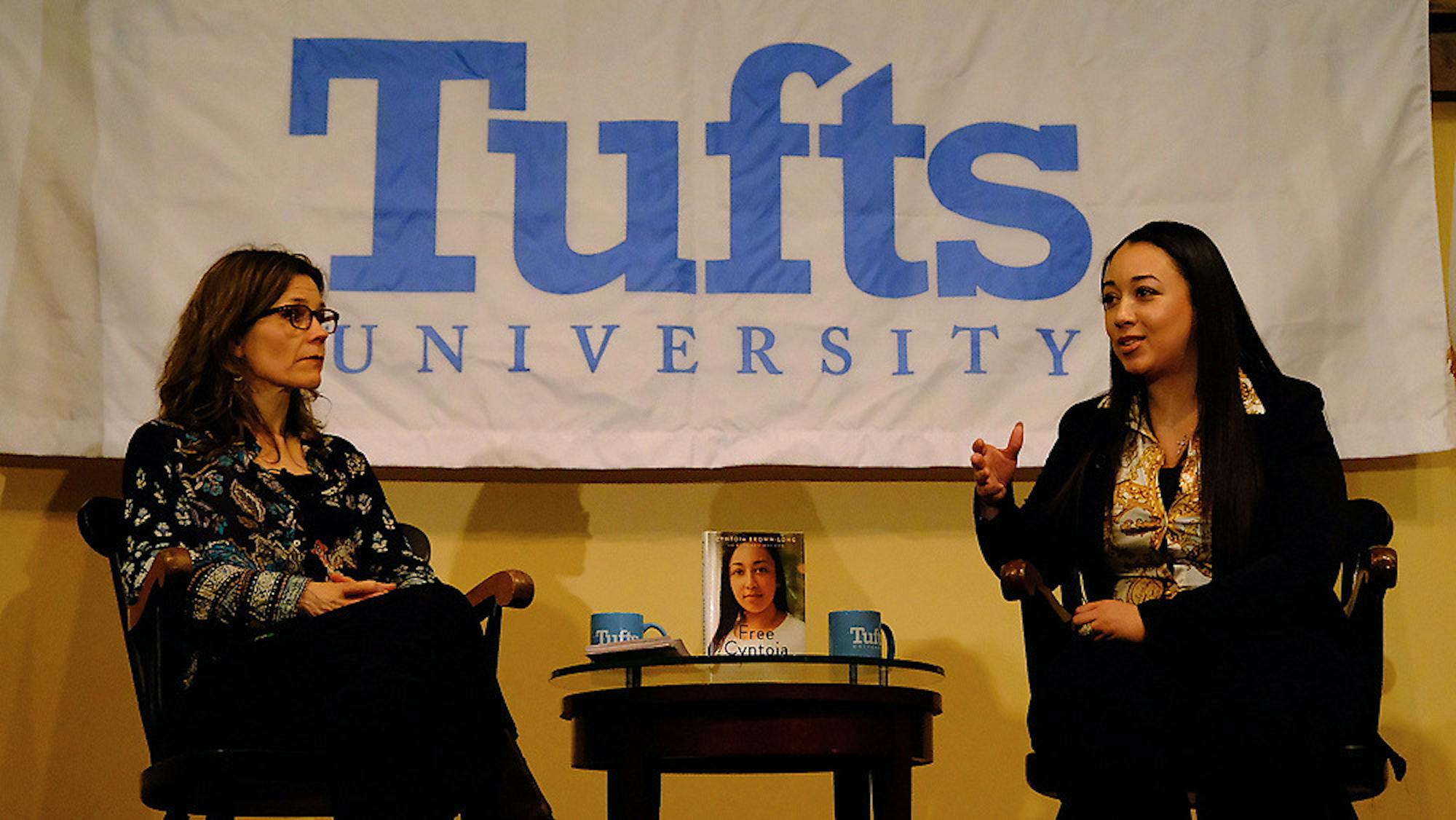Cyntoia Brown-Long discussed her experiences and problems with the criminal justice system and her current initiatives for prison reform as part of the Jonathan M. Tisch College of Civic Life's Distinguished Speaker Series on Thursday in Breed Memorial Hall.
Alan Solomont, dean of Tisch College, introduced Brown-Long with a brief summary of her life experiences, which began with an upbringing by a single mother who struggled with alcohol abuse. Solomont explained that Brown-Long was later the victim of sex trafficking in her early teenage years by a man with whom she saw herself as being in a relationship.
At 16 years old, she was arrested for killing a man who solicited her for sex. After she was tried in a court as an adult and sentenced to life in prison, Solomont explained that people, including celebrities and religious leaders, heard about Brown-Long’s case and took to social media to voice their disappointment with how it was handled and demand her freedom with the hashtag #FreeCyntoia.
Then-Tennessee governor Bill Haslan later commuted her initial sentence to 15 years, and she was released on Aug. 7, 2019.
Brown-Long recalled the most poignant injustices she perceived over the course of her incarceration.
“A lot of times when you’re in the court system, you think, ‘Well, if I just explain this and let them know what happened ... they’re going to rule in my favor,’" she said. "But that’s not what happens. What happens is whoever can spin the best narrative, whoever can put on the best performance in the courtroom, that’s who ends up winning, and nine times out of 10, it’s going to be the prosecution.”
In addition to discovering that courts did not function in the way she would have hoped, Brown-Long reflected that her actual experience in prison was focused less on rehabilitation than it was on containment.
“The reality is what I and many of the women I was incarcerated with experienced is that from the time we stepped foot into the facility, we were just treated as [if] we were there to be warehoused, put under some kind of strict control; rules changed every single day," she said.
Brown-Long explained that she only observed a focus on rehabilitation when grant funding was conditional upon rehabilitative efforts, before suggesting an alternative focus.
“We need to be focused on: How do we get them to the other side of this? How do we get them to be their best selves? What do we do to make sure this person has a successful reentry into society?” she said.
Despite the prison conditions she described, Brown-Long explained that she completed a college education while in prison through Lipscomb University's Lipscomb Initiative for Education (LIFE) program.
“I was four years into serving my sentence when the opportunity presented itself to me to be part of the program," she said. "I jumped through a lot of hurdles, but by the grace of God, I got in it, and I was expecting, ‘I’m going to further my education, I’m going to get something that’s going to look good when I go before the court and I go before the governor [in her appeal process] and it’s going to look good on paper,’ but once I got into the class, what I realized is I had been welcomed into a community.”
Brown-Long went on to describe that she graduated with a 4.0 grade point average with the support she found there, even though her education before that had stopped at seventh grade. In addition to the community she found through the LIFE program, Brown-Long identified three other pillars of support: her mother, her husband and above all, God.
“Even when I struggled, [my mom] was always there, trying to figure out, ‘How can I help?’” she said. “She tried. She tried very hard, so when I was arrested, and I saw that all these people that I was hanging around [who were] teaching me all these things that no 13-year-old girl ever should learn, they were nowhere to be found. The only person left standing with me was my mother, and she has been my best friend from that moment.”
Brown-Long explained that her husband, Jamie Long, led her to a new religious path while she was incarcerated. She credited God for saving her and for her success today.
“I was told everything about my existence should revolve around pleasing a man, and the men that I was introduced to, I was supposed to put them … on a pedestal, and when I met Jaime, he was like, ‘Wait a minute. That’s not what this is. You don’t live for me. You live your life for Christ.’ And I was like, ‘Wow, that’s completely different,’” she said. “And that’s what showed me God is with you, all the time … Now, I get to spend my days with my best friend, with my partner. My husband, he's everything to me. He’s awesome.”
In light of her experiences, Brown-Long has become an advocate for prison reform, which she began while still in prison. Much of her activism is channelled through her own initiative, called Grassroots Learning Initiative for Teen Trafficking, Exploitation and Rape (GLITTER).
“When I saw that there [were] things that needed to be changed, I didn’t want to sit in the classroom and just be talking. I didn’t want to say, ‘this isn’t right in the system, this shouldn’t be this way,'" she said. "I started having conversations with people, and next thing you know, I’m sitting in a prison visitation area with a state representative, talking about a bill that he’s going to represent on my behalf to change the sentencing of juveniles."
Brown-Long discusses personal journey, advocacy for criminal justice reform

Cyntoia Brown-Long talks about criminal justice reform in Breed Memorial Hall on March 5.





